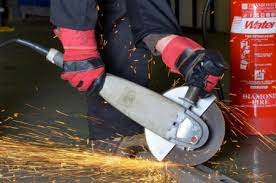


 349,500 Offered Certificates
349,500 Offered Certificates
 24/7 Online Training
24/7 Online Training
 Money Back Guarantee
Money Back Guarantee
 Fully Accredited Courses
Fully Accredited Courses

Created at: 22-02-2025 21:48
Abrasive wheels are essential tools in various industries, including construction, manufacturing, and metalworking. Understanding what they are and the associated risks is crucial to maintaining workplace safety.
Abrasive wheels, also known as grinding wheels or cutting wheels, are circular discs made from abrasive particles. They are designed to grind, cut, or shape materials, typically metal. The wheels come in various types, including:
While abrasive wheels are invaluable, they pose several risks if not handled correctly. Common safety risks include:
Proper training is vital in ensuring safe handling and operation of abrasive wheels. Certified training programs, like those offered for Abrasive Wheels Training in Dublin, are designed to educate workers on:
To mitigate risks when using abrasive wheels, follow these safety guidelines:
In Ireland, the use of abrasive wheels falls under various workplace safety regulations. Employers must ensure compliance with the following:
Implementing best practices can significantly reduce the likelihood of accidents:
To ensure compliance with health and safety standards, consider enrolling in an Abrasive Wheels Course in Ireland. Location-specific courses are available:
By completing a certified course, you not only improve your skills but also ensure a safer working environment.
Abrasive wheels are invaluable in various industries, but they come with significant risks that can be mitigated through proper training and adherence to safety guidelines. Ensure your workplace complies with legal requirements and invest in certified abrasive wheels training to protect yourself and your colleagues. For more information on training programs in your area, visit Abrasive Wheels Course or contact us at [email protected] today!